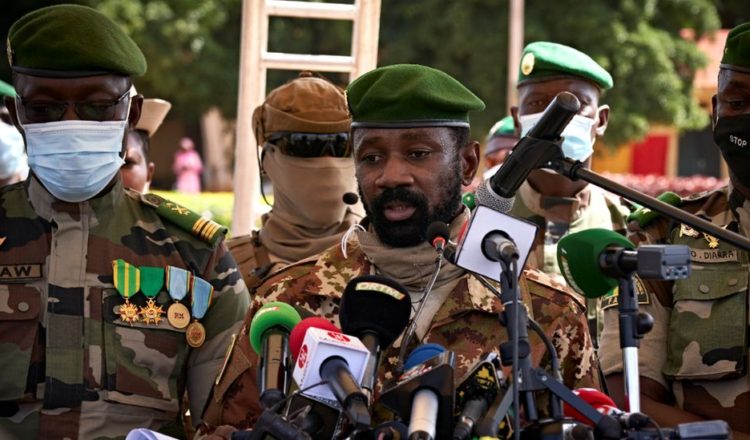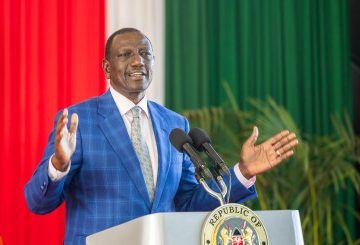The UN High Commissioner for Human Rights has condemned Mali’s decision to ban French media outlets and urged the country’s military rulers to reverse their decision.
“We are deeply disappointed by the Malian media regulator’s decision to permanently suspend Radio France International [RFI] and France24,” a spokesperson for High Commissioner Michelle Bachelet said on Friday.
“These suspensions are the latest in a series of actions aimed at restricting Mali’s press freedom and freedom of expression, and they come at a time when more, not less, scrutiny is required.”
Mali’s military leaders imposed the suspensions on March 16, accusing the two broadcasters of spreading false allegations about the army’s human rights violations.
The High Authority for Communication announced on Wednesday that the provisional suspensions would be permanent.
Journalist organizations have condemned an increase in attacks and smear campaigns against reporters in the last year, particularly against representatives of French media outlets. Foreign and local reporters covering Mali have decried a deterioration in the country’s climate for media professionals.
“We hadn’t had this level of scrutiny before,” said a freelancer contributing to French media who asked not to be identified for security reasons. “The situation has deteriorated since tensions between France and Mali began to rise.” It’s a political problem.”
The Committee to Protect Journalists also demanded on Friday that the authorities reverse their decision to ban RFI and France 24.
“The decision by Malian authorities to solidify these suspensions demonstrates just how committed they are to denying those in their country access to information,” said Angela Quintal, CPJ’s Africa program coordinator, in a statement.
On February 6, French journalist Benjamin Roger, a reporter for Jeune Afrique, was arrested and deported within 24 hours of arriving in Bamako, Mali’s capital. According to the authorities, the reporter lacked press credentials. They announced a week ago that it would be more difficult for media representatives to obtain a media permit.
“Until now, press accreditation has rarely been demanded, and its absence has not prevented journalists from working freely,” said Reporters Without Borders in a statement.
On April 8, Reporters Without Borders commemorated the one-year anniversary of the kidnapping of French journalist Olivier Dubois, a correspondent for the French newspapers Libération, Le Point, and Jeune Afrique. On March 14, the al-Qaeda-affiliated Jama’a Nusrat ul-Islam wa al-Muslimin (JNIM), a coalition of armed groups, released a video confirming his survival.
Sophie Petronin, a French aid worker, was kidnapped in Gao in 2016 and released four years later. Ghislaine Dupont and Claude Verlon, two RFI journalists, were kidnapped and killed by gunmen in the Malian town of Kidal in 2013, after finishing an interview with a Tuareg separatist leader.
Meanwhile, the UN has condemned how such a situation is causing reporters still inside the country to practice self-censorship.
“The current climate has a pervasive chilling effect on journalists and bloggers,” said UN Spokesperson Ravina Shamdasani on Friday.
“Our office continues to document serious allegations of violations of international human rights law and international humanitarian law in many parts of the country, and we remain deeply concerned about efforts to further restrict the already limited civic space.”
Tensions between Mali and France have risen since a military coup led by Colonel Assimi Goita on August 8, 2020, which deposed elected President Ibrahim Boubacar Keita, who had the support of France.
France, a former colonial power in the region, suspended joint military operations with Malian forces in June 2021, pending assurances that civilians would return to positions of power.
French President Emmanuel Macron announced that he would begin the withdrawal of troops, approximately 5,100 soldiers, stationed in the region since 2013 as part of Operation Barkhane, which spans five Sahel countries: Burkina Faso, Chad, Mali, Mauritania, and Niger.
The Economic Community of West African States (ECOWAS) regional bloc and the African Union suspended Mali from their organizations and threatened sanctions in response to the army’s takeover of power in Mali.
Malian Prime Minister Choguel Kokalla Maiga expelled France’s ambassador in January after accusing the country of fomenting insecurity and division.
Mali is ranked 99th out of 180 countries in the 2021 World Press Freedom Index, according to Reporters Without Borders.





